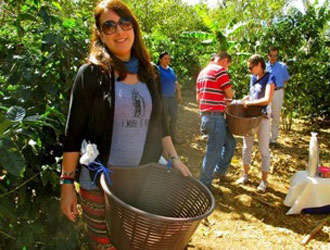Costa Rica as your classroom

Students in the Tulane CIAPA program spend a day in Tarrazú at the Coopetarrazu Coffee Cooperative. (Photo from CIAPA)
“There is a whole infrastructure in place in Costa Rica for students to travel around the county and experience nature,” says Ludovico Feoli, executive director of the Center for Inter-American Policy and Research at Tulane.
Feoli is one of six Tulane professors teaching intensive two-week classes at CIAPA this semester. He taught the semester's first course, Environmental Politics and Policy. The program is interdisciplinary and involves faculty members from the School of Science and Engineering, the School of Liberal Arts, the Payson Center for International Development and the Law School.
“Costa Rica is a great place to study environmental policy because it has been at the forefront of policy innovation,” Feoli says.
Students are dividing their days between indoor seminars and out-of-classroom time in the laboratory that is Costa Rica, says Kathy Jack, Tulane anthropology professor and director of the tropical and environmental studies program.
“This program is incredible because students experience things firsthand,” Jack says. “This is an experience that these students will never forget.”
Over the course of the semester, students will visit nature preserves, beaches, volcanoes as well as San José cultural and political institutions.
Tulane sophomore Suzi Kondic is studying at CIAPA and appreciates the two-week-long intense classes and free time for travel. Kondic recently visited the Nicoya Peninsula on the Pacific coast of Costa Rica, known for its pristine beaches. “It was absolutely beautiful,” Kondic said in an email, “and such a rewarding experience.”
The current environmental studies semester at CIAPA is the latest offering at the prestigious academic research institution.
This summer, CIAPA will host a Spanish immersion program for college students. For the fall semester in 2015, Tulane students can travel to Costa Rica for the Central American Experience Fall Semester, where students will study Central American politics and culture from a regional perspective.
Mary Sparacello is a communications specialist in the Office of Development Communications.
